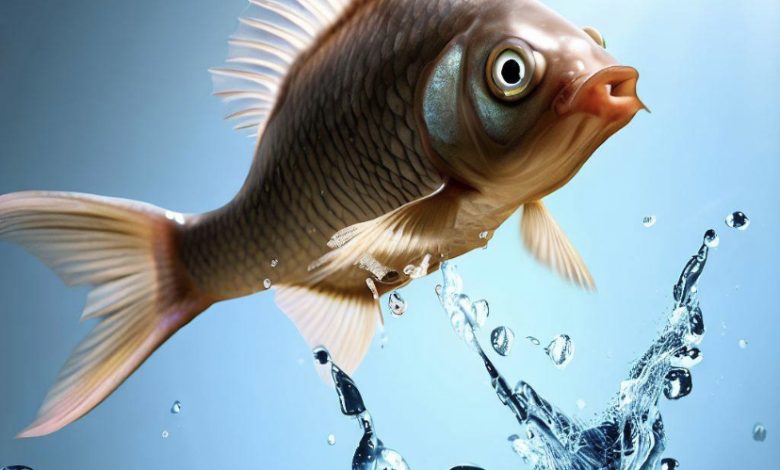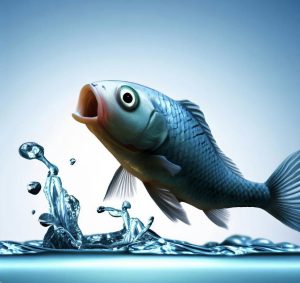Why Do Fish Jump Out of Water?

Have you ever been near a body of water and witnessed a fish suddenly leaping out of its aquatic realm? It’s quite a sight to behold, and you might find yourself wondering, “What on earth is that fish doing?” Well, fear not, my curious friend! In this article, we’re going to dive into the reasons behind fish jumping out of the water and explore the fascinating ways this behavior benefits them in their natural environment.
Why Do Fish Jump Out of Water?
There are two factors making Fish Jump Out of Water which are
- Escaping Unfavorable Conditions
- Hunting and Prey Capture
Escaping Unfavorable Conditions: Picture this: a fish finds itself in a patch of water with low oxygen levels, high temperatures, or even pollutants. Not exactly ideal living conditions, right? Well, that clever fish knows it too! By propelling themselves out of the water, they can seek out more suitable habitats or even access pockets of oxygen-rich air. It’s their way of saying, “Hey, this place isn’t cutting it for me. I’m off to find something better!”
Hunting and Prey Capture: Fish are quite savvy hunters, and their jumping behavior can give them a leg up in the hunting game. Take species like salmon or trout, for example. They’ve perfected a technique called “porpoising.
” These agile swimmers leap out of the water repeatedly to nab insects or small prey near the water’s surface. It’s like a surprise attack from above, making it easier for them to snatch up their unsuspecting meal. Talk about using their acrobatic skills to their advantage!
Also Read: How many fish can I keep in a 10-gallon tank?
Fish on the Fly: A Leap from Predators?

Now, you might be wondering, “Do fish really jump out of the water to escape from predators?” Well, it’s not the primary reason for their jumping escapades, but it can certainly come into play for some fishy species.
Flying Fish: Prepare to be amazed by the extraordinary flying fish! These incredible creatures have evolved the ability to glide through the air for short distances.
Environmental Factors: Making Waves in Jumping Behavior
Now that we understand the motivations behind fish jumping, let’s explore how environmental factors can influence their decision to take the plunge (or leap).
Temperature and Oxygen Levels: Fish are quite sensitive to changes in their surroundings, and they aren’t fans of extreme temperatures or low oxygen levels. When the water temperature rises too high or the oxygen becomes scarce, fish might start feeling a bit uncomfortable.
That’s when they may decide it’s time to jump ship (or rather, water) in search of more favorable conditions. By taking a leap, they can find cooler waters or areas with higher oxygen content. It’s like their own version of a summer getaway or a breath of fresh air.
Disturbances and Pollution: Unfortunately, fish aren’t immune to the consequences of human activities. Pollution, habitat disturbances, and excess noise can all disrupt their natural behaviors, including jumping. Imagine being a fish, minding your own business, and suddenly there’s loud construction noise nearby.
It’s not exactly the serene underwater world you signed up for, is it? In response to these disturbances, fish may exhibit abnormal jumping behavior or even decrease their jumping activity altogether. So, it’s crucial for us to be mindful of our actions and strive to protect their aquatic habitats.
Fish Communicate With by Jumping
Fish have their own unique ways of communicating and interacting with one another, and you might be surprised to learn that jumping behavior can be a part of their social repertoire.
Courtship and Dominance Displays: Ah, love is in the air (or water)! During courtship rituals, certain fish species take their acrobatics to a whole new level. Take the majestic male betta fish, for instance.
They’re known for their vibrant colors and impressive fins, but did you know they also showcase their fitness and breeding potential through acrobatic jumps?
These magnificent males perform breathtaking leaps to catch the attention of females and establish dominance over rival suitors. It’s like a fishy version of a talent show, where the best jumpers win the hearts of their potential mates.
So, next time you witness a fish leaping out of the water, know that it might just be their way of saying, “Look at me! I’m the one you’ve been waiting for!”
Also Read: Do Betta Fish Have Tongues?
Breeding, Reproduction, and the Great Leap Forward
When it comes to the circle of life, fish jumping can play a vital role in their breeding and reproductive cycles. Let’s take a dive into this fascinating aspect of their aerial adventures.
Navigating Obstacles: Some fish face quite a challenge when it comes to reaching their spawning grounds. Picture a mighty waterfall or raging rapids blocking their path.
It might seem impossible, but these determined fish have a trick up their fin! They gather their strength and launch themselves into the air, clearing those formidable obstacles like true champions. By taking that great leap forward, they ensure that their species continues to thrive for generations to come.
Now, that’s what we call dedication to parenthood!
So, the next time you spot a fish making a splash, remember that it’s not just a random act of aquatic rebellion. Fish jumping behavior serves important purposes, from escaping unfavorable conditions to hunting, communication, and reproduction. It’s a fascinating display of their adaptability and resilience in the vast underwater world. Let’s continue to marvel at their acrobatic feats and work together to preserve their watery habitats for generations of jumping fish to come.
Understanding and Protecting the World of Jumping Fish
Fish jumping behavior is a captivating aspect of their lives, offering insights into their adaptability, communication, and survival strategies. By appreciating and studying this behavior, we can deepen our understanding of their complex lives and the delicate balance of aquatic ecosystems.
However, it’s crucial that we play an active role in protecting their habitats. Our actions can directly impact fish populations and their jumping behaviors. By reducing pollution, conserving water resources, and implementing sustainable fishing practices, we can contribute to the preservation of their natural habitats.
Additionally, supporting conservation efforts and advocating for responsible environmental policies can help safeguard the diverse array of fish species that rely on healthy aquatic ecosystems.





